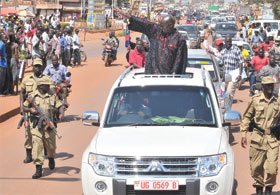Uganda is ‘A Failed State’, Otunnu insists
By John Stephen Katende
20th Dec 2010
Uganda People’s Congress [UPC] presidential candidate Dr. Olara Otunnu has said Uganda under Yoweri Museveni’s presidency is increasingly viewed around the world as “a failed State”.
In an interview with Uganda Correspondent last week following the launch of his party’s election manifesto, the UPC president insisted that he wouldn’t lightly label his own country as a failed State without objective evidence.
“…Uganda is my motherland and I love it as much as I love myself. I therefore wouldn’t label it a failed State lightly. My conclusion is firmly premised on objective evidence of how the education system has failed, how the health sector has collapsed, how institutions of State have been systematically undermined by Museveni, how the fundamental human rights of our people are being violated, the list is really endless”, Otunnu said.
Otunnu said UPC’s manifesto, titled “A Failed State: Programme for Rehabilitation and Reconstruction of Uganda, is unique. The key message UPC is sending out, Otunnu said, is that Uganda is off-track.
Echoing Otunnu’s message, UPC’s Secretary General Joseph Bbosa added that “…Uganda is on a wrong foundation and there’s need to reconstruct the foundation of its nationhood”.
Highlights of UPC’s 2011 election manifesto
In its manifesto, UPC says it wants to “re-invent Uganda” by putting in place a new architecture of governance and distribution of power in the country. This, the party says, will be partly done by convening “…a national convention to institute a new constitutional order that reflects the collective free will and aspirations of the people of Uganda”.
Otunnu also promised that as soon as he is elected, he will establish a Truth and Reconciliation Commission [TRC] with a view to correcting what he called “the wrongs of the past” in the interest of unity and togetherness. On top of the TRC, UPC has also promised to introduce a day of national mourning in remembrance of all the victims of Uganda’s “dark chapters”; right from 1971.
The other key plunks of UPC’s manifesto are its firm promises to Ugandans that it will restore the two-term presidential limits; solve the Buganda question as well as the role and status of the Kabaka. The party also promised to introduce a federal system of governance.
On the question of free and fair elections, UPC says it plans disband the Kiggundu-led Electoral Commission to set in place “…an independent and credible Electoral Commission” which will have representation from all political parties with a presence in Parliament. Otunnu also promised to increase the budget of the new EC and introduce transparent mechanisms for it to compile a clean and verifiable register of voters.
As a man who spent most of his adult life outside Uganda, Otunnu also said a UPC government will engage Ugandans in the Diaspora who he said contribute a lot of money to Uganda’s development. For that, Otunnu said, a UPC government will set up a “Diaspora Affairs Department” that will be by a Minister of State.
He also promised to not only grant Diaspora Ugandans dual citizenship but full voting rights as well. With that, Otunnu said, Ugandans in the Diaspora will be free to vie for any elective office in the land like their Ugandan based counterparts.
UPC also says Museveni’s NRM has destroyed the civil service by recruiting people on basis of their loyalty to the regime. To redress the inequality, Otunnu said UPC plans to make the Public Service Commission “…independent and free from political control”.
Apart from the new policies Otunnu announced to revamp the economy, agriculture, the health sector, to create employment, to fully professionalize the national army and fight corruption, to fight abuse of the law, the UPC President also said Uganda is facing a “moral crisis” and there was need to give “special priority” to what he called “the struggle for the soul of our country”.
Finally, Otunnu says, a UPC government will introduce transparency in its dealings with the oil and mineral sectors and devote at least 25-30% from all natural resources to development of the local communities.
The remaining oil and mineral revenue percentage, Otunnu says, will be allocated to education, health and building the national infrastructure. END. Please log into www.ugandacorrespondent.com every Monday to read our top stories and anytime mid-week for our news updates.
![]()


